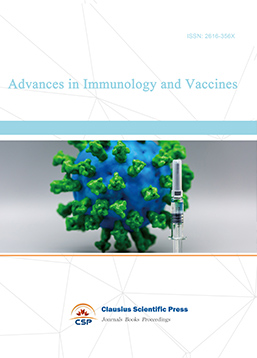Advances in the Study of Adverse Reactions to Immune Checkpoint Inhibitors in Chinese and Western Medicine
DOI: 10.23977/medsc.2022.030620 | Downloads: 9 | Views: 1261
Author(s)
Yuyao Gao 1, Jianfeng Quan 2
Affiliation(s)
1 Shaannxi University of Chinese Medicine, Xianyang, Shaanxi, 712046, China
2 Affiliated Hospital of Shaanxi University of Chinese Medicine, Xianyang, Shaanxi, 710077, China
Corresponding Author
Jianfeng QuanABSTRACT
Lung cancer is currently the second most prevalent malignancy worldwide. The approval and clinical application of immune checkpoint inhibitors (ICIs) have led to a number of patients with non-small cell lung cancer (NSCLC) and small cell lung cancer (SCLC) with varying degrees of disease Lung cancer has entered the era of immunotherapy with different degrees of benefit in progressionfree survival (PFS) and overall survival (OS). However, with the widespread clinical application of ICIS, several aspects of immune-related adverse events (irAEs) have emerged, posing a problem for the clinical application and exploration of ICIs. The use of Chinese medicine can significantly reduce the incidence of irAEs as well as alleviate the symptoms of adverse reactions, and also has a significant role in improving the quality of patient survival and prolonging patient survival.
KEYWORDS
Chinese Medicine, Immune Checkpoint Inhibitors, Immune-Related Adverse Reactions, Lung CancerCITE THIS PAPER
Yuyao Gao, Jianfeng Quan, Advances in the Study of Adverse Reactions to Immune Checkpoint Inhibitors in Chinese and Western Medicine. MEDS Clinical Medicine (2022) Vol. 3: 120-126. DOI: http://dx.doi.org/10.23977/medsc.2022.030620.
REFERENCES
[1] Sung H, Ferlay J, Siegel RL, et al. Global Cancer Statistics 2020: GLOBOCAN Estimates of Incidence and Mortality Worldwide for 36 Cancers in 185 Countries [J]. CA Cancer J Clin, 2021, 71(3):209-249.
[2] Zou W, Chen L. Inhibitory B7-family molecules in the tumour microenvironment [J]. Nat Rev Immunol, 2008, 8(6):467-77.
[3] Weber JS, Dummer R, de Pril V, et al. Patterns of onset and resolution of immune-related adverse events of special interest with ipilimumab: detailed safety analysis from a phase 3 trial in patients with advanced melanoma [J]. Cancer, 2013, 119(9):1675-82.
[4] Caturegli P, Di Dalmazi G, Lombardi M, et al. Hypophysitis Secondary to Cytotoxic T-Lymphocyte-Associated Protein 4 Blockade: Insights into Pathogenesis from an Autopsy Series [J]. Am J Pathol, 2016, 186(12):3225-3235.
[5] Osorio JC, Ni A, Chaft JE, et al. Antibody-mediated thyroid dysfunction during T-cell checkpoint blockade in patients with non-small-cell lung cancer [J]. Ann Oncol, 2017, 28(3):583-589.
[6] Samaan MA, Pavlidis P, Papa S, et al. Gastrointestinal toxicity of immune checkpoint inhibitors: from mechanisms to management [J]. Nat Rev Gastroenterol Hepatol, 2018, 15(4):222-234.
[7] M RM, Y WJ, B CH. Chinese medicine and tumor immunotherapy [J]. Chinese Journal of Nature, 2019, 41(4):6.
[8] Jing G, Ju-Yong W, Zhong-Da L. Reflections on Chinese medicine and immunity [J]. Chinese Journal of Traditional Chinese Medicine, 2013, 31(9):3.
[9] Ma B, Anandasabapathy N. Immune Checkpoint Blockade and Skin Toxicity Pathogenesis [J]. J Invest Dermatol, 2022, 142(3 Pt B):951-959.
[10] Kumar V, Chaudhary N, Garg M, et al. Current Diagnosis and Management of Immune Related Adverse Events (irAEs) Induced by Immune Checkpoint Inhibitor Therapy [J]. Front Pharmacol, 2017, 8:49.
[11] Mojsak D, Dębczyński M, Kuklińska B, et al. The Many Faces of Immune Checkpoint Inhibitor-Associated Pneumonitis: 4 Case Reports [J]. Am J Case Rep, 2022, 23:e936420.
[12] Yamagata A, Yokoyama T, Fukuda Y, et al. Impact of interstitial lung disease associated with immune checkpoint inhibitors on prognosis in patients with non-small-cell lung cancer [J]. Cancer Chemother Pharmacol, 2021, 87(2):251-258.
[13] Linardou H, Gogas H. Toxicity management of immunotherapy for patients with metastatic melanoma [J]. Ann Transl Med, 2016, 4(14):272.
[14] Hercun J, Vincent C, Bilodeau M, et al. Immune-Mediated Hepatitis During Immune Checkpoint Inhibitor cancer Immunotherapy: Lessons From Autoimmune Hepatitis and Liver Immunology [J]. Front Immunol, 2022, 13:907591.
[15] Dougan M, Blidner AG, Choi J, et al. Multinational Association of Supportive Care in Cancer (MASCC) 2020 clinical practice recommendations for the management of severe gastrointestinal and hepatic toxicities from checkpoint inhibitors [J]. Support Care Cancer, 2020, 28(12):6129-6143.
[16] Tajiri K, Aonuma K, Sekine I. Immune checkpoint inhibitor-related myocarditis [J]. Jpn J Clin Oncol, 2018, 48(1):7-12.
[17] Alruwaii ZI, Montgomery EA. Gastrointestinal and Hepatobiliary Immune-related Adverse Events: A Histopathologic Review [J]. Adv Anat Pathol, 2022, 29(4):183-193.
[18] Bruera S, Suarez-Almazor ME. The effects of glucocorticoids and immunosuppressants on cancer outcomes in checkpoint inhibitor therapy [J]. Front Oncol, 2022, 12:928390.
| Downloads: | 10301 |
|---|---|
| Visits: | 781819 |
Sponsors, Associates, and Links
-
Journal of Neurobiology and Genetics

-
Medical Imaging and Nuclear Medicine

-
Bacterial Genetics and Ecology

-
Transactions on Cancer

-
Journal of Biophysics and Ecology

-
Journal of Animal Science and Veterinary

-
Academic Journal of Biochemistry and Molecular Biology

-
Transactions on Cell and Developmental Biology

-
Rehabilitation Engineering & Assistive Technology

-
Orthopaedics and Sports Medicine

-
Hematology and Stem Cell

-
Journal of Intelligent Informatics and Biomedical Engineering

-
MEDS Basic Medicine

-
MEDS Stomatology

-
MEDS Public Health and Preventive Medicine

-
MEDS Chinese Medicine

-
Journal of Enzyme Engineering

-
Advances in Industrial Pharmacy and Pharmaceutical Sciences

-
Bacteriology and Microbiology

-
Advances in Physiology and Pathophysiology

-
Journal of Vision and Ophthalmology

-
Frontiers of Obstetrics and Gynecology

-
Digestive Disease and Diabetes

-
Advances in Immunology and Vaccines

-
Nanomedicine and Drug Delivery

-
Cardiology and Vascular System

-
Pediatrics and Child Health

-
Journal of Reproductive Medicine and Contraception

-
Journal of Respiratory and Lung Disease

-
Journal of Bioinformatics and Biomedicine


 Download as PDF
Download as PDF